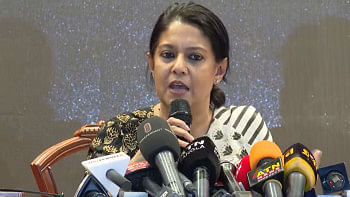Is Bangladesh ready to face the hit of Mpox?

The World Health Organisation (WHO) has classified the Mpox epidemic a Public Health Emergency of International Concern (PHEIC) on August 14, 2024, prompting governments throughout the world to reevaluate their readiness. Bangladesh, a highly populated South Asian country, is at a critical juncture as the new, more transmissible Clade 1b type of Mpox spreads fast throughout Africa and beyond, prompting a thorough assessment of its preparedness to face this possible calamity.
The global health community is on high alert following the discovery of the Clade 1b form, which appears to spread more easily through sexual networks, adding a new dimension to the issue. Mpox mostly infects people and animals. It is in the same viral family as smallpox, although the symptoms are milder, such as fever, chills, and body pains. However, it has the potential to cause serious disease and even death in certain circumstances.
Bangladesh's previous experience with health emergencies, particularly the COVID-19 pandemic, serves as a framework for its response to the Mpox danger. Despite being pressured, the country's public health system has demonstrated resilience and adaptation in recent years. However, the distinct properties of mpox and its novel version need a custom response plan. Early detection and surveillance are one of the most significant difficulties Bangladesh confronts.
Dhaka airport has implemented a system to handle passengers with Mpox symptoms, in response to the World Health Organisation's global public health alert. The airport is providing leaflets, and arrival health desks are staffed by doctors 24/7. Passengers' temperature is screened using thermal scanner archways, and those with symptoms will be sent to designated hospitals via ambulance if necessary. The airport's health team recommends avoiding close contact with suspected or confirmed cases, wearing medical masks, avoiding skin-to-skin contact, using disposable gloves, and regularly cleaning hands with soap or alcohol-based hand rubs.
Health authorities need to set up a strong surveillance system, evaluate its laboratory's competence, and promptly train healthcare professionals about mpox symptoms and diagnostic procedures. During the COVID-19 pandemic, Bangladesh made progress in strengthening its diagnostic capacities; nonetheless, testing for Mpox necessitates specialised knowledge and equipment. In order to upgrade facilities, the nation must evaluate its present laboratory infrastructure and look for outside assistance. Two worldwide Mpox vaccines are still not widely available in Bangladesh, and in order to obtain vaccination doses, the health ministry must work with foreign groups. It is important to have a well-defined vaccine priority plan that targets high-risk populations and healthcare workers.
Bangladesh is getting ready for a possible epidemic of Mpox by concentrating on producing necessary drugs and vaccinations locally. To investigate these options, the government should communicate with pharmaceutical corporations. In order to share resources, knowledge, and best practices for mpox preparedness and response, regional cooperation—especially within the context of the South Asian Association for Regional Cooperation (SAARC)—may be indispensable. Bangladesh has significant expertise and assets at its disposal, such as its handling of prior medical crises. However, Mpox and its new variant's distinct qualities necessitate a customised, all-encompassing strategy. Early planning, vigilant monitoring, strong public relations, and multinational collaboration are essential for success.
By taking proactive steps now, Bangladesh can strengthen its resilience against Mpox and other potential health emergencies. As the global health landscape evolves, Bangladesh's ability to adapt and respond effectively will be crucial for protecting its population and contributing to global health security. Continuous assessment, adaptation, and collaboration will be essential in navigating this new chapter in global public health.
The writer is a student of Geography and Environment department of University of Dhaka. E-mail: paromabasak322@gmail.com


 For all latest news, follow The Daily Star's Google News channel.
For all latest news, follow The Daily Star's Google News channel. 






Comments